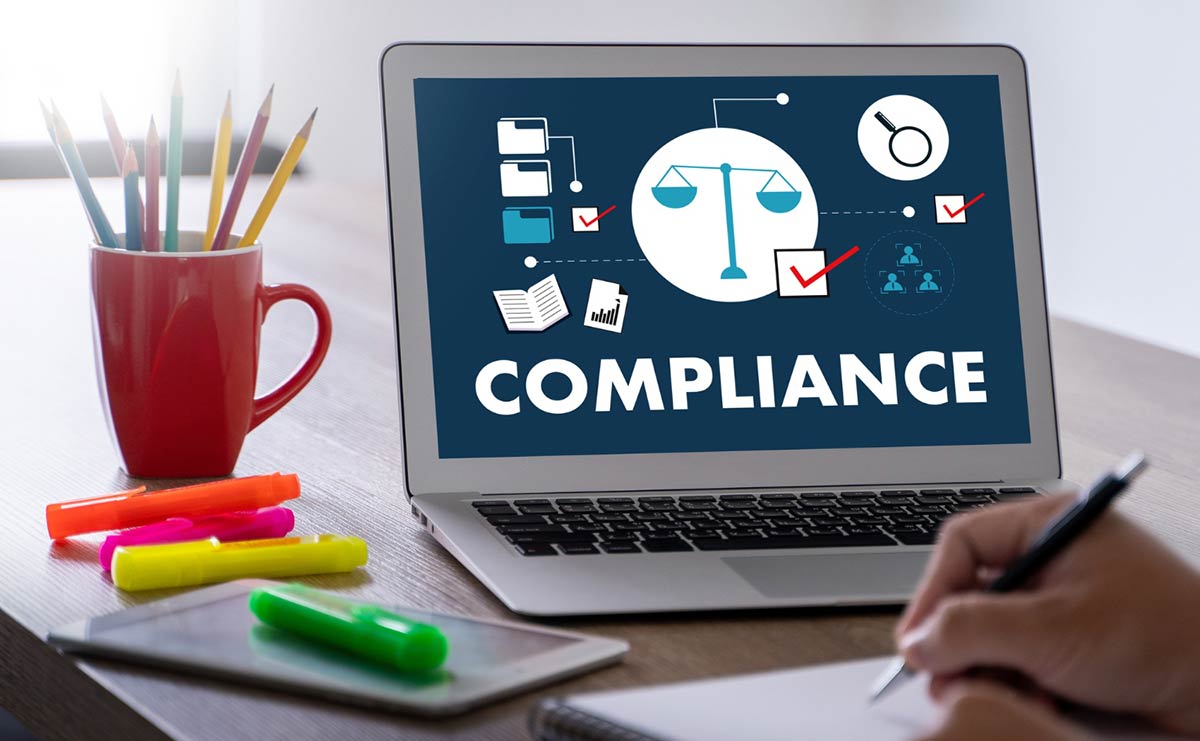Contents
Navigating Compliance Challenges in Law Firms: Key Issues and Solutions
The firm prioritized law firm compliance by regularly updating its policies and procedures to reflect the latest legal requirements and industry best practices. In today’s complex legal environment, law firms must navigate a multitude of compliance obligations to ensure they operate within legal and ethical boundaries while maintaining the trust and confidence of their clients. Adherence to data protection regulations, anti-money laundering, conflict of interest management, and ethical conduct is critical for a law firm’s success and reputation. A robust compliance program that incorporates clear policies, regular training, and proactive risk management strategies is essential in helping law firms meet these obligations, avoid costly penalties, and uphold the integrity of the legal profession. Meeting law firm compliance requirements is essential for ensuring that legal practices uphold their professional responsibilities and avoid potential legal and financial penalties.
What is Compliance Law?
Compliance law refers to the body of legal requirements, standards, and regulations that organizations must adhere to in order to operate within the legal framework set by governmental authorities. Compliance law encompasses a broad range of areas, from corporate governance and financial reporting to data protection and environmental regulations. The primary objective of compliance law is to ensure that businesses and other organizations conduct their operations in a lawful, ethical, and socially responsible manner. Compliance law ensures that companies meet these legal standards to avoid penalties, fines, or legal actions.
Key Compliance Obligations for Law Firms
When it comes to key compliance obligations for law firms, they must adhere to a variety of regulatory and ethical standards to ensure they operate within the bounds of the law and maintain the trust of their clients. The law firm compliance program will be strengthened by developing clear policies on data protection, conflicts of interest, and billing practices, ensuring that all legal and ethical standards are consistently met. Here are some of the most critical compliance obligations:
Client Confidentiality and Data Protection
Law firms must ensure that all client communications and information are kept confidential, as per the attorney-client privilege. Compliance with data protection regulations, such as GDPR and PIPEDA, is crucial. This includes implementing security measures to protect sensitive client data and following proper procedures for data breaches.
Anti-Money Laundering (AML)
Law firms must have systems in place to prevent money laundering and terrorism financing. This includes conducting due diligence on clients, reporting suspicious activities, and keeping proper records.
Conflict of Interest Management
Firms must have procedures to identify and manage conflicts of interest. This involves ensuring that no situation arises where a firm’s duty to one client conflicts with its duty to another client or its own interests.
Ethical Conduct and Professional Responsibility
Law firm compliance requirements encompass a broad range of regulations and ethical standards that firms must adhere to in order to operate legally and maintain client trust. Adhering to the rules of professional conduct set by legal bodies, such as the American Bar Association (ABA) in the U.S., is essential. This covers areas such as competency, diligence, communication, and fairness.
Billing and Financial Compliance
Law firms must ensure transparency and accuracy in their billing practices, adhering to ethical guidelines regarding fees and costs. This includes providing clear explanations of charges and avoiding overbilling.
Client Trust Accounts (IOLTA Accounts)
Proper management of client funds held in trust is a critical compliance area. Law firms must keep these funds separate from their own and ensure that they are handled according to the rules governing Interest on Lawyers Trust Accounts (IOLTA).
Regulatory Compliance and Licensing
Law firms must ensure that all practicing attorneys maintain their licenses and comply with continuing legal education (CLE) requirements. They must also adhere to any specific regulations applicable to their jurisdiction.
Employment Law Compliance
Compliance with employment laws, including those related to anti-discrimination, workplace safety, and employee rights, is crucial for law firms. This includes proper management of employment contracts, payroll, and benefits.
Records Management and Retention
Law firms must have policies in place for the proper management and retention of records, ensuring that documents are stored securely and retained for the appropriate length of time as required by law.
Cybersecurity
With the increasing reliance on digital systems, law firms must implement robust cybersecurity measures to protect against data breaches, hacking, and other cyber threats.
Advertising and Marketing Compliance
Law firms must adhere to rules governing legal advertising, ensuring that all marketing materials are truthful, not misleading, and comply with ethical standards.
Environmental, Social, and Governance (ESG) Compliance
Firms, especially those with corporate clients, may need to address ESG issues, ensuring they operate in a manner that is socially responsible and environmentally sustainable.
Compliance with these obligations is not just about avoiding penalties but also about maintaining a firm’s reputation, ensuring client trust, and upholding the integrity of the legal profession.
The Impact of Non-Compliance on Law Firm Reputation and Client Trust
Non-compliance with legal and ethical standards can have severe repercussions for law firms, particularly in terms of reputation and client trust. Here’s a closer look at the potential impact:
Damage to Reputation
Non-compliance incidents, such as data breaches, ethical violations, or conflicts of interest, can severely tarnish a law firm’s public image. In an industry where reputation is crucial, negative publicity can lead to a loss of credibility and respect within the legal community. Law firms involved in high-profile non-compliance cases often attract media attention, which can amplify the negative impact. News of a firm’s failure to comply with regulations can spread quickly, making it difficult to contain the damage. A damaged reputation can lead to a decline in a firm’s standing within the legal industry, affecting its ability to attract top talent, secure partnerships, and participate in industry events.
Loss of Client Trust
Clients entrust law firms with highly sensitive information. Any breach of confidentiality, whether due to a data breach or mishandling of information, can result in clients losing trust in the firm’s ability to protect their interests. Non-compliance can be seen as a sign of incompetence or lack of professionalism. Clients may question the firm’s ability to effectively manage their legal matters if it cannot adhere to basic regulatory requirements. Those who lose trust in a law firm due to non-compliance are likely to take their business elsewhere. This can lead to a significant loss of revenue, especially if high-value clients are involved.
Legal and Financial Consequences
Non-compliance can result in substantial fines and penalties from regulatory bodies. These financial losses can further strain the firm’s resources and damage its reputation among clients and peers. Clients may sue the firm for damages if they suffer harm due to the firm’s non-compliance. Legal battles can be costly, time-consuming, and damaging to the firm’s reputation, especially if the case is made public. Repeated or severe instances of non-compliance can lead to increased scrutiny from regulatory bodies, resulting in more frequent audits, investigations, and potential sanctions against the firm.
Client Acquisition and Retention Challenges
A tarnished reputation makes it challenging to attract new clients, particularly those who prioritize compliance and ethical practices. Potential clients may choose to work with firms that have a stronger track record of compliance. Non-compliance can erode long-standing client relationships. Clients who have trusted a firm for years may reconsider their association if they believe the firm no longer aligns with their values or standards.
Impact on Employee Morale and Retention
Non-compliance incidents can create internal turmoil, leading to a loss of trust among employees. Staff members may feel less confident in the firm’s leadership and prospects, which can affect morale and productivity. High-performing legal professionals may leave the firm if they perceive its reputation is at risk, further exacerbating the firm’s challenges. This can also make it harder to attract top talent in the future.
Ethical and Professional Consequences
Non-compliance with ethical standards can result in disciplinary actions from bar associations, including censure, suspension, or disbarment of attorneys. Such actions can have lasting effects on the firm’s reputation and ability to practice law. Non-compliance can lead to the revocation of professional certifications or accreditations, which can further damage the firm’s standing and credibility in the legal community.
Long-Term Impact on Business Sustainability
A significant loss of clients due to non-compliance can threaten the firm’s financial stability and long-term viability, particularly for small or mid-sized firms. Once damaged, a law firm’s reputation can take years to rebuild. This requires significant investment in compliance, public relations efforts, and demonstrating a renewed commitment to ethical practices.
Increased Operational Costs
To regain trust and ensure future compliance, firms may need to invest heavily in new compliance programs, training, and technology. While necessary, these expenses can strain the firm’s financial resources. Non-compliance incidents can lead to higher insurance premiums for the firm, particularly for professional liability insurance, further increasing operational costs.
Client Referrals and Business Development
Clients who have had negative experiences due to a firm’s non-compliance are likely to share their concerns with others, leading to a loss of potential referrals and business development opportunities. Other professionals, such as accountants or consultants, may be hesitant to refer clients to a law firm with a poor compliance record, further limiting the firm’s growth prospects.
To mitigate these risks, law firms must prioritize compliance, invest in robust systems and processes, and foster a culture of ethical practice and transparency.
Overcoming Compliance Challenges in Law Firms
Overcoming compliance challenges in law firms requires a strategic and proactive approach. Here are key strategies that law firms can implement to address and mitigate compliance challenges effectively:
Develop a Comprehensive Compliance Program
Establish clear, comprehensive policies that cover all areas of compliance, including data protection, conflict of interest, billing practices, and regulatory adherence. These policies should be easily accessible and regularly updated. Implement a compliance framework that aligns with both legal obligations and ethical standards. This framework should include guidelines for decision-making, risk management, and reporting procedures.
Appoint a Dedicated Compliance Officer or Team
Designate a compliance officer or team responsible for overseeing all compliance-related activities. This individual or team should be well-versed in the relevant laws, regulations, and ethical requirements and should have the authority to enforce compliance across the firm. Ensure that the compliance officer provides regular reports to the firm’s leadership, highlighting areas of concern, potential risks, and progress on compliance initiatives.
Leverage Technology and Compliance Tools
Utilize compliance management software like RunSensible to automate and streamline compliance processes. These tools can help with tracking regulatory changes, managing client data securely, conducting conflict checks, and monitoring adherence to internal policies. Implement robust cybersecurity solutions to protect client data and comply with data protection laws. This includes using encryption, secure communication channels, and regular vulnerability assessments.
Provide Ongoing Training and Education
To maintain law firm compliance, the firm implemented a comprehensive framework that includes regular training on regulatory adherence and ethical decision-making for all employees. This training should be mandatory and tailored to the specific roles and responsibilities within the firm. Ensure that attorneys meet their continuing legal education CLE requirements and stay informed about new laws, regulations, and ethical issues that could impact their practice areas.
Establish a Strong Ethical Culture
Firm leadership should demonstrate a strong commitment to ethical behavior and compliance, setting the tone for the entire organization. This includes leading by example and holding everyone accountable for their actions. Encourage a culture where ethical decision-making is prioritized, and where employees feel comfortable raising concerns or reporting potential violations without fear of retaliation.
Conduct Regular Audits and Assessments
Perform regular internal audits to assess compliance with policies and regulations. These audits should evaluate areas such as client confidentiality, billing practices, and data security. Conduct risk assessments to identify potential compliance challenges and vulnerabilities. Use the findings to update policies, procedures, and controls to address identified risks.
Implement Robust Conflict of Interest Management
Use advanced conflict-checking systems to identify potential conflicts of interest before taking on new clients or cases. Ensure that all attorneys and staff are trained on how to use these systems effectively. Continuously monitor for conflicts of interest throughout the duration of a client relationship, not just at the outset. Update conflict checks as new information arises or as the firm takes on new matters.
Enhance Client Communication and Transparency
Maintain clear and open communication with clients regarding compliance-related matters, such as billing practices, data protection, and potential conflicts of interest. Transparency builds trust and helps manage client expectations. Regularly seek client feedback on the firm’s compliance practices and make adjustments as necessary to address concerns or improve processes.

Stay Informed on Regulatory Changes
Assign a team or individual to monitor regulatory developments that could impact the firm’s operations. This includes changes in data protection laws, financial regulations, and ethical standards. Develop strategies to quickly adapt to regulatory changes, including updating policies, training staff, and modifying operational practices as needed.
Create a Crisis Management Plan
Develop a comprehensive incident response plan that outlines the steps to take in the event of a compliance breach, data breach, or other crisis. This plan should include communication strategies, roles and responsibilities, and procedures for mitigating damage. Conduct regular drills to ensure that all staff members are familiar with the crisis management plan and can respond effectively in an emergency.
Collaborate with External Experts
Consider engaging external legal consultants or compliance experts to provide advice, conduct audits, or assist with complex compliance issues. These experts can offer an objective perspective and help the firm stay ahead of potential challenges. Participate in peer networks or industry groups where best practices and compliance strategies are shared. Learning from the experiences of other firms can provide valuable insights and help avoid common pitfalls.
Focus on Data Management and Protection
Implement and enforce data retention policies that comply with legal requirements and best practices. Ensure that data is securely stored, and that unnecessary or outdated data is disposed of properly. Regularly review and update data protection measures to prevent breaches. This includes securing digital and physical data, controlling access, and educating employees about the importance of data security.
Evaluate and Optimize Billing Practices
Ensure that all billing practices are transparent, ethical, and in compliance with regulatory standards. Clients should be fully informed of fees, and any changes to billing structures should be communicated clearly. Maintain accurate and detailed records of all billing activities. Regularly audit billing practices to ensure compliance and address any discrepancies promptly.
Engage in Continuous Improvement
Establish feedback loops that allow for continuous evaluation and improvement of compliance programs. Regularly update policies and procedures based on feedback from audits, employee input, and changes in the regulatory environment. Be proactive in making adjustments to compliance strategies before issues arise, rather than waiting for a problem to occur. Continuous improvement is key to maintaining effective compliance over the long term.
By adopting these strategies, law firms can not only overcome compliance challenges but also build a culture of ethical practice and proactive risk management. This approach will help firms maintain their reputation, foster client trust, and ensure long-term success in an increasingly complex regulatory landscape.
Role of Compliance Solicitors
The role of Compliance Solicitors within law firms is increasingly vital as regulations across industries become more complex and stringent. Compliance solicitors are responsible for ensuring the law firm regulatory compliance and adherence to all relevant legal requirements. This includes compliance with data protection laws, anti-money laundering (AML) regulations, and other legal obligations specific to the legal industry. They design and implement comprehensive compliance programs within the firm. These programs include policies and procedures that guide the firm’s operations in a way that minimizes legal risks and ensures adherence to applicable laws.
Regular audits are conducted by compliance solicitors to ensure that the firm’s practices align with internal policies and external regulations. These audits help in identifying potential risks and areas where the firm may be falling short of compliance.
Compliance solicitors advise the firm’s partners and staff on managing legal risks. They provide guidance on how to navigate complex regulations, ensuring that the firm’s operations do not inadvertently breach any legal obligations. They play a key role in educating and training the firm’s staff on compliance issues. This includes conducting workshops, creating training materials, and ensuring that everyone in the firm understands the importance of compliance and their role in maintaining it.
When a regulatory body inquires about the firm’s practices, compliance solicitors are responsible for responding. They ensure that the firm’s communications with regulators are accurate, timely, and do not expose the firm to unnecessary risk. In addition to ensuring the law firm’s compliance, these solicitors may also advise clients on compliance issues. They help clients understand and navigate the regulatory landscape, particularly in highly regulated industries.
If there is a suspicion of non-compliance within the firm, compliance solicitors are tasked with conducting internal investigations. They assess the situation, determine the extent of any non-compliance, and recommend corrective actions. The legal and regulatory environment is constantly evolving. Compliance solicitors must stay updated on changes in laws and regulations to ensure that the firm’s practices remain compliant.
By proactively managing compliance, these solicitors help mitigate potential legal liabilities for the firm. This includes avoiding fines, penalties, and reputational damage that can result from non-compliance.
Ensuring Legal Compliance in Your Law Firm with RunSensible
RunSensible offers robust compliance features tailored to legal professionals, helping law firms maintain adherence to various regulations and industry standards. The platform ensures data protection through encryption and secure storage, supports compliance management by tracking regulatory changes and facilitates conflict of interest checks to prevent potential issues. It also promotes transparent and compliant billing practices with detailed invoicing and expense management, while enhancing client communication and transparency. Additionally, RunSensible provides tools for conducting internal audits and generating compliance reports, ensuring accountability within the firm. RunSensible integrates compliance into its core functionality, making it easier for law firms to manage legal obligations, mitigate risks, and uphold ethical standards.
Conclusion
In conclusion, maintaining robust compliance in a law firm is not just a legal necessity but a fundamental pillar for sustaining trust, reputation, and long-term success. By integrating comprehensive compliance programs, appointing dedicated compliance officers, leveraging technology, and fostering a culture of ethical practice, law firms can effectively navigate the complex regulatory landscape. The role of compliance solicitors is crucial in ensuring that firms stay ahead of potential risks and adhere to the ever-evolving legal standards. Ultimately, prioritizing compliance safeguards the firm’s integrity enhances client trust, and fortifies its standing in the legal community.
Disclaimer: The content provided on this blog is for informational purposes only and does not constitute legal, financial, or professional advice.







